Baby Let Me Follow You Down
 |
Though Bob Dylan has long since achieved iconic status as a songwriter, he started out like just about everyone else as an interpreter of others' songs. In fact, he started out as an interpreter of others' interpretations of others' songs. In the case of Baby Let Me Follow You Down the proximate other was a Cambridge-based blues and folk guitarist by the name of Eric Von Schmidt (shown right with Maria Muldaur) who said in a Boston Globe interview years later:
I sang [Dylan] a bunch of songs, and, with that spongelike mind of his, he remembered almost all of them when he got back to New York.
Hence, the origin of the name Sponge Bob.
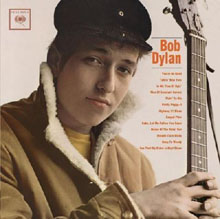 |
Alright, that was gratuitous. Sorry. Let's cut to the music. This song's greatest claim to fame is that Dylan not only included it on his first recording in 1962, but that it has stayed in his active repertoire off and on ever since. Though he took to rocking out on it in the mid 60's, his original cover of Von Schmidt's cover was, like everything else on that debut album, acoustic and stripped down to the point of transparency. Here it is:
Audio Clip: Bob Dylan plays Baby Let Me Follow You Down, from Bob Dylan, 1962
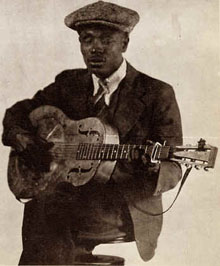 |
As we shall see, the song is something of a musical cameleon. Von Schmidt himself had first heard it performed by the great Piedmont blues guitarist Blind Boy Fuller as Mama Let Me Lay It On You. Swapping "Mama" out for "Baby", that's also how Rev. Gary Davis played and sang it. Though Davis' life and career were both much longer than Fuller's, the two men were contemporaries and aquaintances from at least the mid-1920's until Fullers' death in 1941. Von Schmidt himself credits Davis with writing much of the song, so Fuller probably picked it up from him. Regardless, in the audio clips that follow you can clearly hear the similarities in their fingerstyle arrangements as well as what makes each man's approach distinctive.
Audio Clip: Blind Boy Fuller, (with Sonny Terry on harp) Mama Let Me Lay It On You, 1938
Audio Clip: Rev. Gary Davis, Baby Let Me Lay It On You, from Blues and Ragtime
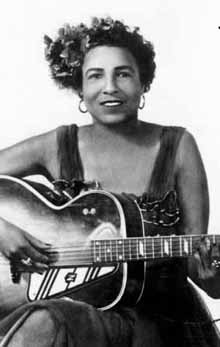 |
Von Schmidt was either overly generous or underinformed, however, when he proffered a songwriting credit upon the good Reverend. At most, Davis was reworking material that was in circulation by the mid 1930's. Right around the same time as Blind Boy Fuller's 1937 recording of the song, The Harlem Hamfats were waxing Let Your Linen Hang Low, which they also recorded as Baby Don't You Tear My Clothes. Of the two, the former version is more interesting for our purposes because it features Rosetta Howard offering the female response to this most predictable and persistent of male pleas. The great Memphis Minnie had offered much the same response to her first husband, Kansas Joe McCoy, when he had inquired, Can I Do It For You?, on their recording of the song half a decade earlier. That's the earliest recording of the song I have found, so I'll include a clip of that as well.
Audio Clip: The Harlem Hamfats with Rosetta Howard, Let Your Linen Hang Low, 1937
Audio Clip: Memphis Minnie and Kansas Joe McCoy, Can I Do It For You?, circa 1930
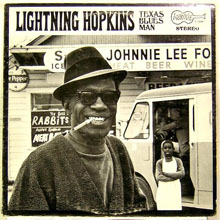 |
Now, if you don't mind, I'd like to revisit this bit about Baby Don't You Tear My Clothes. We skipped over that, and I think you'll have to admit that that is anything but a predictable male plea. I can't remember ever saying it, myself. Still, that's the way Lightnin' Hopkins would play it. And any excuse to listen to Lightnin' Hopkins will do. So there, we have one:
Audio Clip: Lightnin' Hopkins, Baby Don't You Tear My Clothes
So let's see...that would be 5 titles for the song so far, with enough changes in the chord progression, melody and lyrics to keep the lawyers at ASCAP and BMI occupied for decades. The fact is, an exhaustive treatment of the song's permutations would be, well, exhausting. So you are going to be spared hearing the otherwise substantial Jackie DeShannon beg Baby, Let Me Follow You Round. And no, we don't have time for the Animals' organ-drenched Baby Let Me Take You Home. Sadly, you are going to miss the fingerstyle instrumental versions by both Bakers -- Etta and Duck, that is. Dave Van Ronk's and Jorma Kaukonen's versions are swell, but they were working from the Gary Davis and Blind Boy Fuller material -- so we're good there.
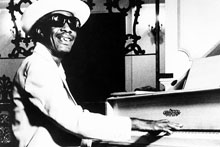 |
Which leaves, what? Something new. Something fresh. Something preferably G rated. I've got it... Professor Longhair. The grand old man of New Orleans R&B gave it his signature rhumba-tinged treatment as Baby Let Me Hold Your Hand. Let's follow him down, and out.
Audio Clip: Professor Longhair's, Baby Let Me Hold Your Hand
All Community Guitar Resources text & material © 2006 Andrew Lawrence
